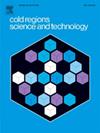Freezing of a Supercooled Water Drop after an Impact onto a Solid Wall
IF 3.8
2区 工程技术
Q1 ENGINEERING, CIVIL
引用次数: 0
Abstract
Supercooled water freezes as a result of ice nucleation, propagation along the substrate of a thin ice layer and subsequent expansion of a mushy region of ice dendrites. In this experimental study, the impact, spreading and solidification of the drop are observed in a cold wind tunnel using a high-speed video system. The statistics of the nucleation times after a supercooled water drop impacts onto a dry solid substrate are analyzed. The experiments demonstrate that the rate of the ice nucleation is enhanced significantly by drop impact and continuously reduces over time. The nucleation rate increases with higher impact velocity and is enhanced by the substrate roughness. This effect is explained by the presence of the small bubbles in the liquid drops, generated by drop impact and fast spreading. The surfaces of these bubbles serve as the additional triggers for ice nucleation. Moreover, the effect of the presence of the bubbles becomes even more significant when the wetted area reduces due to the drop receding. The average number of the nucleation sites in this case increases, since the number of bubbles does not reduce despite the reductions of the wetted area. These bubbles are probably captured by the receding contact line.
过冷水滴撞击实心墙壁后冻结
过冷的水结冰是由于冰核形成、薄冰层沿基底传播以及随后冰枝状突起的粘稠区域扩张。在这项实验研究中,使用高速视频系统在冷风隧道中观察了水滴的冲击、扩散和凝固过程。研究分析了过冷水滴撞击干燥固体基底后的成核时间统计。实验结果表明,水滴撞击会显著提高冰的成核率,并随着时间的推移不断降低。成核率随冲击速度的增加而增加,并因基底粗糙度而增强。液滴撞击和快速扩散产生的小气泡可以解释这种效应。这些气泡的表面是冰核形成的额外触发器。此外,当液滴后退导致润湿面积减小时,气泡存在的影响会变得更加显著。在这种情况下,成核点的平均数量会增加,因为尽管润湿面积减小,气泡的数量并没有减少。这些气泡可能被后退的接触线捕获。
本文章由计算机程序翻译,如有差异,请以英文原文为准。
求助全文
约1分钟内获得全文
求助全文
来源期刊

Cold Regions Science and Technology
工程技术-地球科学综合
CiteScore
7.40
自引率
12.20%
发文量
209
审稿时长
4.9 months
期刊介绍:
Cold Regions Science and Technology is an international journal dealing with the science and technical problems of cold environments in both the polar regions and more temperate locations. It includes fundamental aspects of cryospheric sciences which have applications for cold regions problems as well as engineering topics which relate to the cryosphere.
Emphasis is given to applied science with broad coverage of the physical and mechanical aspects of ice (including glaciers and sea ice), snow and snow avalanches, ice-water systems, ice-bonded soils and permafrost.
Relevant aspects of Earth science, materials science, offshore and river ice engineering are also of primary interest. These include icing of ships and structures as well as trafficability in cold environments. Technological advances for cold regions in research, development, and engineering practice are relevant to the journal. Theoretical papers must include a detailed discussion of the potential application of the theory to address cold regions problems. The journal serves a wide range of specialists, providing a medium for interdisciplinary communication and a convenient source of reference.
 求助内容:
求助内容: 应助结果提醒方式:
应助结果提醒方式:


